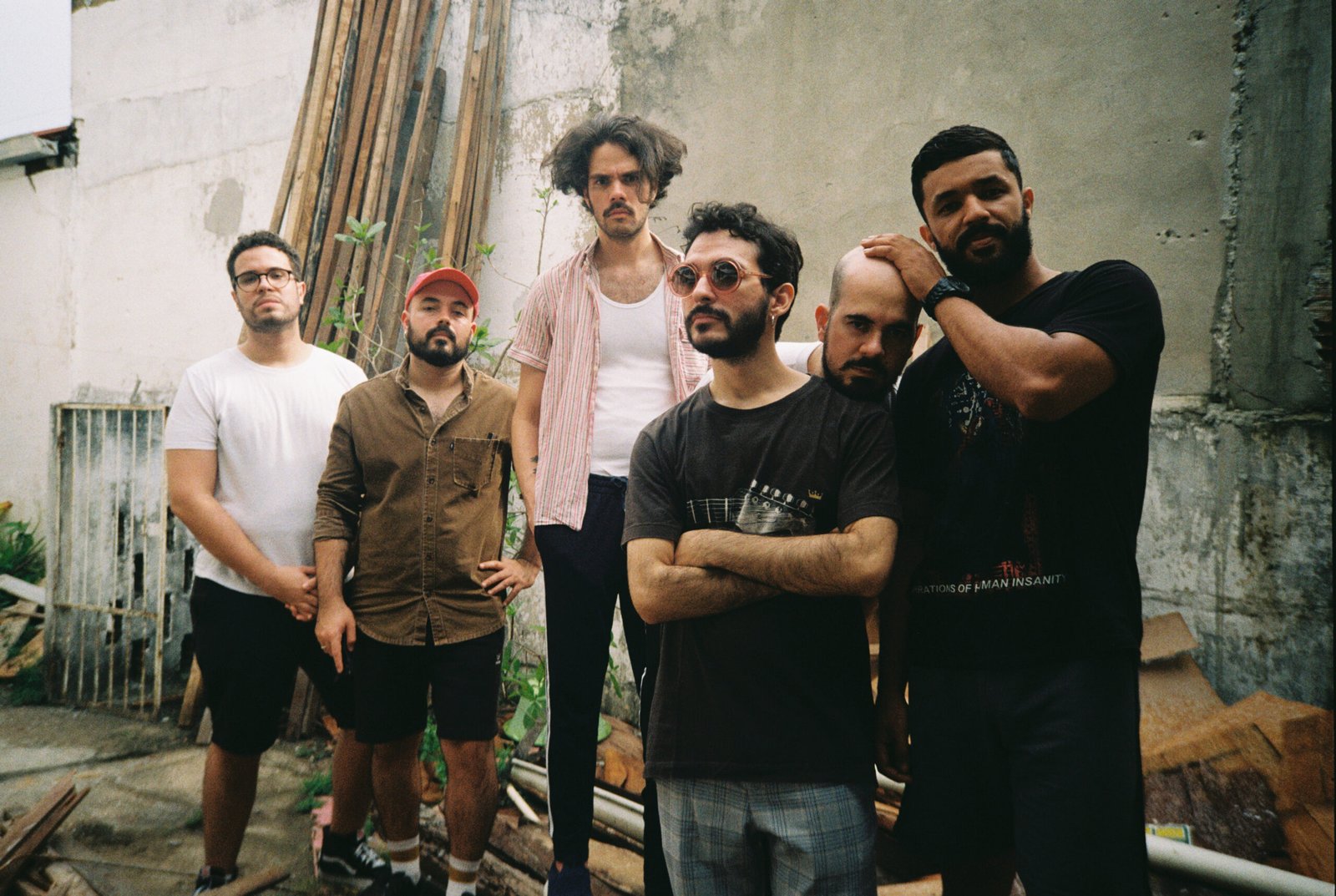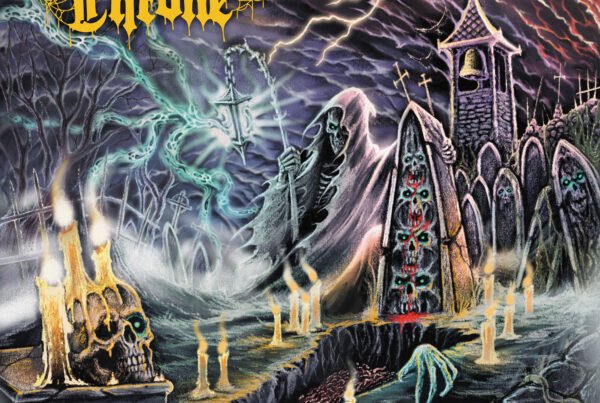Metallic prog/zeuhl masters Papangu chronicle a legendary Brazilian bandit’s rise gloriously on their sophomore Lampião Rei.
Release date: September 6, 2024 | Repose Records | Bandcamp | Facebook
You know, one of more subtle thrills of listening to music from around the world is learning about the culture and history that informs some bands. Metal and prog especially seem to relish in evoking the past tales and legends of their homelands, turning them into fertile fields of lyrical exploration. It’s a double delight to hear great new music, and also get an education! Even while suffering from a language barrier, I may have never known about Brazil’s Cangaço movement if it weren’t for Papangu and their excellent new album Lampião Rei.
Hailing from Eastern Brazil, Papangu isn’t a new name to me. Their debut album Holoceno hit me like a ton of bricks when it first dropped in 2021. Their blend of sludge, black metal, and zeuhl felt so different and refreshing among my normal listening at the time, and ended up easily one of my favorite albums from that year. The wait for more material since has felt very long to me, and to not beat around the bush, Lampião Rei is entirely worth that wait. Papangu has dropped another excellent album, and has also subtly retooled their approach.
Whereas Holoceno was a rugged, dark album influenced by climate catastrophe and the Bolsanaro era, Lampião Rei is a much brighter album. It cuts back on some of the metal heft to tell the story of the rise of Lampião, a famed Brazilian bandit and folk figure active in the early 20th century, with elements of magical realism woven in. Underpinning this narrative is a more melodic iteration of their sludge/zeuhl hybrid rendered through their Brazilian identity, and it sounds just excellent.
After the short intro of “Acende a Luz: I. Alquimia”, Papangu quickly establishes their blend of solo, choral, and harsh vocals, intertwining guitar lines, and emotive keyboards over tight, jazzy percussion. “Acende a Luz: II. O Encandeio / III. Sagüatimbó” is an excellent intro to the band’s vibe replete with catchy vocals hooks and flights of instrumental soloing that knows exactly when to bring in a heavier riff (recalling Mastodon, Baroness, or maybe Opeth with a very different guitar tone) to get a groove going. “Boitatá (Incidente na pia batismal da Capela de Bom Jesus dos Aflitos)” comes across as heavier and doomier, featuring growls first and foremost over a loping riff broken by more cosmic moments and mantra-like vocals. It’s definitely one of the tunes that recalls chief influence Magma more than the others, and features a legitimately beautiful sonic shift about half-way through where flutes join the mix. At is root, ‘zeuhl’ does translate to ‘celestial’ in Magma’s self-made Kobaïan language, and Papangu regularly lives up to that description throughout.
The deeper into Lampião Rei one listens, the more Papangu’s sound opens up, and it makes for an absolute blast of an album. “Oferenda no Alguidar” is probably one of my favorite songs this year at this point with its infectious riffing, drifts into psychedelic bliss, killer vocal hooks, and dramatic mellotrons. It’s just jazzy perfection. And I definitely have to credit Papangu with an excellent sense of pacing across Lampião Rei. The mid-album break provided by the minimalist “Mulher Rendeira” and the catchy percussion and singalong of “Sol Raiar (Caminhando na Manhã Bonita)” make for a nice breather from the relentless drive of the first half of the album and the more broad, exploratory second section where the band’s Latin jazz roots really dominate.
The ending drive of the album is just outstanding, and shows just how happy Papangu is to throw ideas at a wall as long as they know the idea will stick. “Maracutaia” leads off with an off-kilter piano rhythm and slick percussion before running the whole gamut of stomping rhythm, a killer guest bass solo (from Magma bassist Philippe Bussonnet, no less), drum solos, black metal charge, and actual effective use of a rubber chicken as an instrument. Seriously, it’s wild, and it never once loses the plot. Closers “Ruínas” and “Rito de Coroação” are just outstanding, integrating new synth tones and expanding on their King Crimson influences in a way that recalls a wide swath of their works. The former, predominantly instrumental track brings back some lovely flute and jazzy guitar, building to one of my favorite melodies across the entirety of the album. The latter, meanwhile, is just a perfect capstone on the album, bearing some resonant emotional heft, some of the coolest guitar work and grooviest riffs on the album, ending on a pristine dual keyboard coda that wraps the whole album up nicely in a beautiful bow.
As much as it’s bad form, handling this album with a track-by-track review only felt fair given the narrative of the album and how it builds strength to strength and opens up over time. The sextet currently comprising Papangu is on fire throughout the album, and given the band’s statement that most of the recordings are live first takes, I’m always finishing Lampião Rei in awe of how tight and professional Papangu sounds for a band only on their sophomore album. There’s nary a bum note that I’ve noticed, and the band sounds more alive and energetic than you’d expect from even the most hopped-up power trios. They just sound wild and lively, and it would almost seem a shame to single out anyone as the star player because the whole band plays as if they’re sharing a brain. I reckon I do have to highlight Vitor Alves for his excellent drumming, which stood out even in a year where I’ve been wowed by a lot of drummers. But the line-up constructed here is phenomenal, and every member is a genuine credit to their sound.
Speaking of sound, Lampião Rei is produced perfectly. My one gripe with Holoceno was that it’s nature as a partially bedroom project did make it a bit rough sonically. Lampião Rei completely bypasses this with a production that is clear, open, and leaves no element unfairly highlighted or buried in the mix. I feel like there are times where I’m a little too lenient on recording quality, given my love of lo-fi black metal, but my younger prog-loving self knows a great production when he hears one. Lampião Rei is definitely one such case, and maybe my favorite sounding album of the year so far.
It’s been a long three years since Holoceno came out, but I am so damned happy that Papangu took that long to craft Lampião Rei. Every moment of care and polish the band has applied to these nine songs shines through, and even if some of the metal edge has been stepped back, it has made Lampião Rei all the more cohesive as a heavy zeuhl album from a proudly Brazilian band. Prog has been calling me a lot more this year than it has in a while, and Papangu’s ode to a bandit-made-folk legend is some of the absolute best prog I’ve heard in a good while. I deeply hope this tale of Lampião’s rise also marks Papangu’s own rise into worldwide prog renown, and I’ll be waiting with bated breath to hear them tackle the story of his downfall. Zeuhl is still alive, and with bands like Papangu at the helm, it’s doing quite well.






